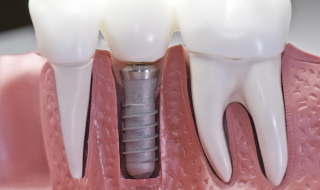
QMUL researchers have been given £500k to assess the effectiveness of a bone graft material to replace missing bone in implants.
The bone graft, developed by a team of experts at Queen Mary University of London (QMUL), has shown potential in preliminary studies, according to the university, and more research is now needed to fulfil the requirements for manufacturing, marketing and selling the product.
‘We are thrilled to have been awarded this research grant and are hugely excited about developing our product and eventually rolling it out to patients,’ Dr Shakeel Shahdad, principal investigator at the Queen Mary University of London, said.
‘The MRC funding will be used to compare the performance of two of our novel material formulations – with regards to their abilities to preserve the dimensions of the bone after tooth extraction and promote new bone formation around dental implants – compared to the current synthetic gold standard material.
‘Initial investigations have demonstrated that our materials integrate well, bind strongly with bone tissue and enhance the formation of new bone at a faster rate compared to other synthetic materials used for the same applications.’
Bone graft material
The new bone graft material will be developed in the form of injectable pastes that can be moulded into shape.
Currently, bone graft materials are in the form of granules that don’t set when applied, consequently they can move around – increasing the risk of the procedure failing.
The new materials currently being developed will harden in a few minutes after being injected into the site, ensuring a completely sealed filling without any parts becoming dislodged.
‘The introduction of these novel injectable materials in dentistry will help overcome the limits of other synthetic materials currently available, such as low degradation rate, poor handling properties and low stability in the site of implantation, which are associated with failures of the surgical procedure,’ Dr Shakeel Shahdad continued.
‘The clinical use of this material for implant dentistry will be beneficial for patients as it will lead to better outcomes, faster healing times and a shorter surgical time.
‘This ultimately reduces patient morbidity, improves the quality of life and reduces costs to the NHS.’


